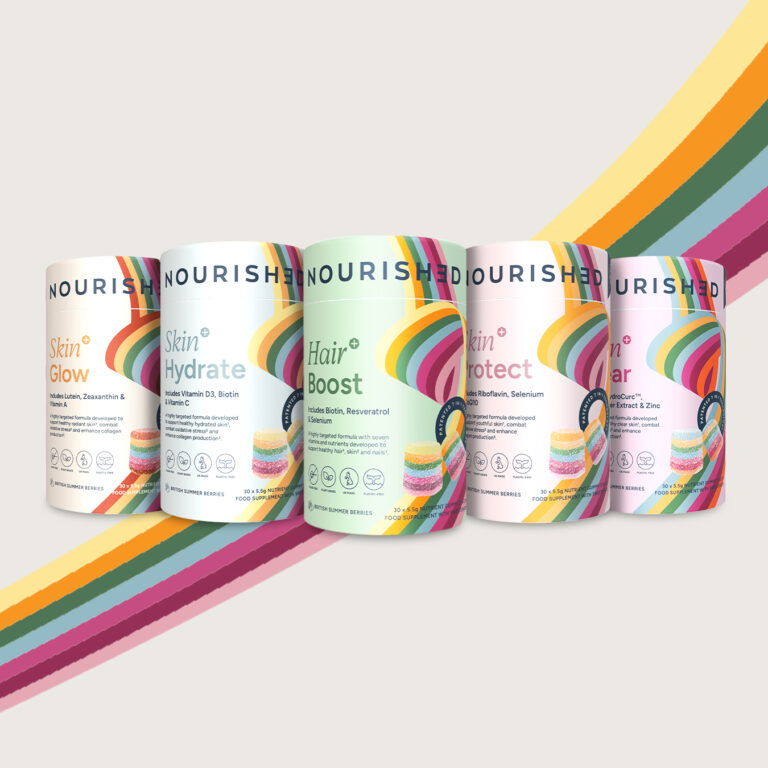Birmingham-based nutrition firm, Nourished, only started five years ago, but it has already made a big impression on some of the UK and Europe’s retail giants.
This month, AUGUST 2025, its high-impact nutrient gummies appeared on the shelves of Holland & Barrett stores nationwide. In the spring, Boots began stocking a range of collagen products online. Nourished also has a partnership with European pharmacy group UPSA and sells in more than 12,000 pharmacies across several countries, including France, Italy and Spain.
So how can a small, young company establish successful working relationships with huge retail outlets, like this?  Nourished founder and CEO Melissa Snover shares the tips she has learned.
Nourished founder and CEO Melissa Snover shares the tips she has learned.
Weave a winning tale
The senior staff at big retailers will engage much more with a product or range if it has a strong story behind it. Create a compelling narrative about what you make, its benefits, how you came up with the idea and its USP.
Use strong evidence to support product claims, and arm yourself with market-trends data to show why you think it has a promising commercial future.
Don’t be shy about demonstrating your past success with current or past products. Highlight good sales figures, clever marketing campaigns and positive customer and retailer feedback.
I previously had a confectionery brand, Goody Good Stuff, which sold in more than 30,000 stores globally. This has always been a very useful way to show that I know how to create consumer products with great growth potential. You may have some kind of retail success you can focus on, too. This might be a product range selling well in several independent shops in different towns. Or you may be able to point to regular stockists, such as garden centres or hardware stores, with whom you’ve worked successfully for several years.
Put yourself in the mind of the retailer.
Your product or service may be brilliant, but you need to show big retailers why it could be good for them. Does it fill gaps in their product offering or add value in a product category? Will it meet customer needs, such as helping combat growing health concerns? Does it fit in well with a new consumer trend?
During discussions about your product appearing in a retailer’s stores, be well prepared to answer questions about the likes of shelf space and pricing. Listen closely to the advice and feedback the retailer’s team gives you and be open to adapting your product, accordingly, from the packaging to the specifications.
Nourished worked with Holland & Barrett and its massive consumer data sets to create a skin and health care range that wasn’t like anything H&B already had. This sort of collaboration is a great way to harness the retailers’ leadership and market knowledge with your SME innovation and agility.
Find some time and money for PR
The big-store buyers probably read many of the sector trade outlets you do. They may also scrutinise industry-awards shortlists to see what exciting new businesses are being honoured.
Raise your media profile by pitching thought-leadership articles to the media, offering to write an article on an important industry topic. Send out press releases about your new projects and ranges.
Find the industry contests that best suit your products and services and spend time crafting entries that highlight how what you offer is better and more innovative than your competitors.
Be flexible in negotiation, but don’t compromise your values.
Higher sales and revenues are nice to have, but not if it means diluting the aims and principles you have carefully established for your company. If the way the big retailer is likely to position or market your product doesn’t sit easily with you, be prepared to walk away.
You have to be ready to discuss things like exclusivity and delivery schedules during retailer negotiations. But you know best how your business works, so don’t feel pressured into signing an unsatisfactory arrangement, particularly if it may reduce product quality or put your team under a lot of stress.
Big stores may try to push for lower margins, longer payment terms or drag negotiations out in the hope you’ll soften your financial stance. Stay firm, with revenue and profit red lines won’t cross. Don’t take a bad deal now for fear of missing out, in the hope of being able to renegotiate it later.
Standing your ground on important points is unlikely to annoy the retailer and make them walk away. It’ll show you have integrity and clarity of purpose.
Try to make sure everyone is in it for the long haul.
Find a partner that shares your long-term values and vision for the development of your products. Someone who hopefully wants to work with you for years, rather than just a short-term deal. Lasting partnerships create more opportunities for mutual growth, new-product collaboration and co-branded initiatives.
Be persistent, but not pushy.
It can take a long time for a retailer to make a decision about putting your products on their shelves. They won’t mind if you follow up professionally after meetings, perhaps with new information or product developments. Just don’t be over-keen or demand constant updates. These teams may be working with dozens of other companies and can be very time poor.
Melissa Snover is CEO and founder of Nourished. Click here for more details about its new skin and hair health range with Holland & Barrett.

